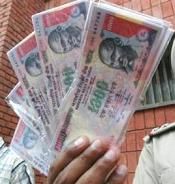 In a first, a special National Investigation Agency court in Mumbai sentenced six accused in a 2009 fake currency case to life imprisonment, terming the possession and circulation of Indian counterfeit notes as an "act of terrorism".
In a first, a special National Investigation Agency court in Mumbai sentenced six accused in a 2009 fake currency case to life imprisonment, terming the possession and circulation of Indian counterfeit notes as an "act of terrorism".
Special NIA judge Prithiviraj Chavan pronounced the sentence after he convicted all the six arrested accused -- Abdul Shaikh, Mohammed Aizul, Ravi Dhiren Gosh Nooruddin Bari, Mohammed Samad and Aizul Shaikh – on Wednesday under relevant sections of the Indian Penal Code and Unlawful Activities (Prevention) Act.
The court also imposed a fine of Rs 1000 on each of the accused.
"This is the first time that the fake currency has been covered under the ambit of a terrorist act," Special Public Prosecutor Rohini Salian said, adding that terrorist acts does not always be a blood crime. The notes were printed in Pakistan, she said.
This case happens to be the first case investigated by the NIA after it was set up post 26/11 attacks to probe and prosecute pan-India crimes, terror related cases and offences affecting the 'sovereignty, security and integrity of India'.
According to the NIA, during investigation it was revealed that the Fake Indian Currency Notes of denomination of Rs 1000 of 2AQ series seized in this case were also recovered at the Kochi currency chest of Reserve Bank of India.
"The similar nature of series of notes found at two different places indicated that there was a wide network operating in circulation of FICN and also the source of both these FICN (seized in Kochi and Mumbai) was the same," said the NIA in a release.
The expert report of the Reserve Bank of India obtained by the NIA stated that many covert features of genuine Indian currency were successfully imitated and could have been achieved only through highly sophisticated machinery only available with sovereign governments. A similar opinion was given by experts of Bank Note Press, Mysore, it said.
The NIA said that their investigation further disclosed that several cases related to recovery of FICN were under investigation all over the country and these seizures appeared to be inter-connected based on similarities of printing.
All the samples of FICN collected from Chandigarh, Karnataka, Kashmir, Maharashtra, Madhya Pradesh, Goa were sent to Security Printing and Minting Corporation of India Limited, New Delhi for expert opinion.
"It was concluded by SPMCIL that the notes have been printed on highly sophisticated machines which a common man cannot acquire since such machines involve huge capital investment," the NIA said adding that the pulp found in the FICN was 100 percent rag.
The perfection of window and watermarks formation indicates the manufacture of FICN paper on regular currency making machines, which can be only be owned by a country or state, it said.
"The second expert report of SPMCIL brought out the similarity between paper used in the FICN samples and that in the legal tender of the neighbouring country," the release said.
Salian said that the NIA procured legal tender notes of countries like Pakistan, Sri Lanka, Nepal, Bhutan and Mayanmar during the probe. "We wanted to study even that currency and its make," she said.
The Anti-Terrorism Squad of the Maharashtra police had arrested six accused on May 14, 2009 from near Star Cinema at Mazgoan in south Mumbai, after they received the tip-off that the accused were planning to exchange money.
The ATS had also seized 75 fake Indian currency notes of Rs 1000 from their possession. Though the preliminary investigation was carried out by ATS, NIA took over the investigation on June 19, 2009.
In the 1000-page chargesheet, filed on November 6, 2009, the prosecution named one Shaukat as the kingpin of the racket and accused a 'hostile' neighbouring country for supporting the crime.
Further according to the chargesheet, the six accused are part of a larger racket and are attempting to destabilise the country's economy with an intention to abet terrorist activities.
Salian had told media persons yesterday that the court has taken circumstantial evidence into account to convict the accused. In the trial that commenced in December 2012, the prosecution had examined 39 witnesses.









